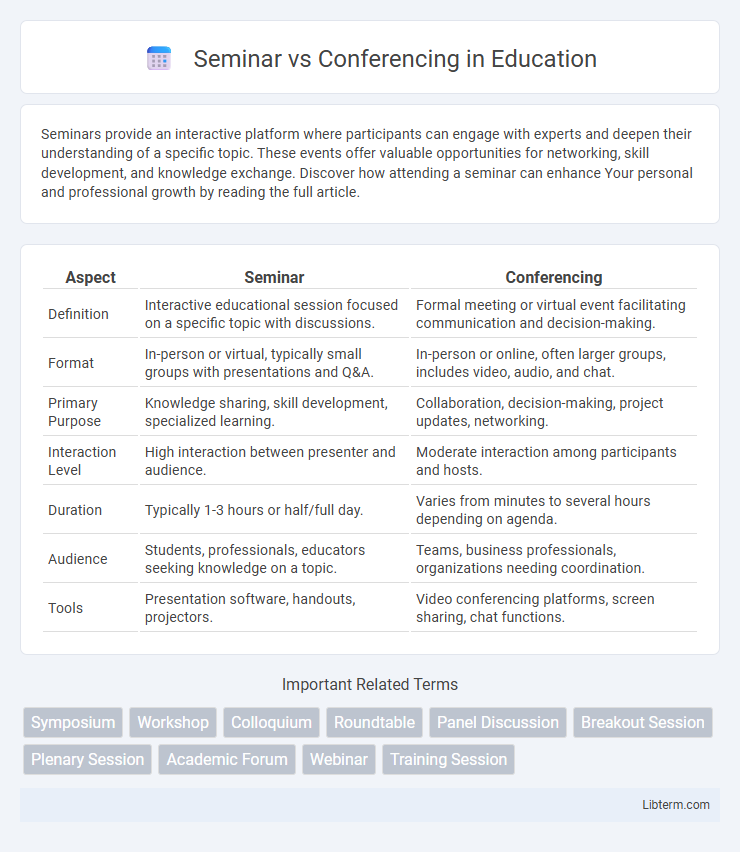Seminars provide an interactive platform where participants can engage with experts and deepen their understanding of a specific topic. These events offer valuable opportunities for networking, skill development, and knowledge exchange. Discover how attending a seminar can enhance Your personal and professional growth by reading the full article.
Table of Comparison
| Aspect | Seminar | Conferencing |
|---|---|---|
| Definition | Interactive educational session focused on a specific topic with discussions. | Formal meeting or virtual event facilitating communication and decision-making. |
| Format | In-person or virtual, typically small groups with presentations and Q&A. | In-person or online, often larger groups, includes video, audio, and chat. |
| Primary Purpose | Knowledge sharing, skill development, specialized learning. | Collaboration, decision-making, project updates, networking. |
| Interaction Level | High interaction between presenter and audience. | Moderate interaction among participants and hosts. |
| Duration | Typically 1-3 hours or half/full day. | Varies from minutes to several hours depending on agenda. |
| Audience | Students, professionals, educators seeking knowledge on a topic. | Teams, business professionals, organizations needing coordination. |
| Tools | Presentation software, handouts, projectors. | Video conferencing platforms, screen sharing, chat functions. |
Understanding Seminars and Conferences
Seminars are structured events focused on in-depth discussions and expert-led presentations that foster interactive learning and skill development within a specific field. Conferences, typically larger in scale, serve as platforms for networking, sharing research, and exploring emerging trends across multiple related topics and industries. Both formats prioritize knowledge exchange, but seminars emphasize participant engagement and workshops, while conferences highlight keynote speeches and panel discussions.
Key Differences Between Seminars and Conferences
Seminars typically involve smaller groups focused on in-depth discussions or training sessions led by experts, emphasizing interactive learning and skill development. Conferences gather larger audiences, featuring multiple speakers or sessions that cover diverse topics within an industry, fostering networking and sharing of broad insights. The key differences lie in scale, purpose, and format: seminars prioritize detailed exploration with participant engagement, while conferences offer wide-ranging content and opportunities for professional connections.
Purpose and Objectives: Seminar vs Conference
Seminars primarily aim to provide in-depth knowledge and foster skill development among participants through focused presentations and interactive discussions. Conferences serve the purpose of networking, sharing research findings, and discussing broader industry trends, often attracting a larger and more diverse audience. Both formats emphasize knowledge exchange but differ in scale and the scope of objectives.
Format and Structure Comparison
Seminars typically feature a smaller audience and emphasize interactive sessions or workshops, fostering direct engagement between speakers and participants in a structured environment. Conferencing involves larger gatherings with multiple sessions or tracks, accommodating diverse topics and formats such as keynote speeches, panel discussions, and networking opportunities. The structure of seminars is usually concise with a focused agenda, whereas conferences offer broader content and longer durations to cover extensive subject matter.
Participant Engagement Levels
Seminar participant engagement typically involves direct speaker-to-audience interaction with opportunities for questions and discussions, fostering deeper individual learning experiences. Conferencing often incorporates multiple sessions, networking events, and collaborative workshops, enabling broader peer interaction and real-time feedback among diverse groups. Engagement levels in seminars tend to be more focused and intensive, while conferences offer varied formats to maintain dynamic participant involvement.
Types of Seminars and Conferences
Seminars typically include workshops, panel discussions, and training sessions designed for interactive learning and skill development, while conferences often feature keynote speeches, breakout sessions, and networking events targeting industry-wide knowledge exchange. Types of seminars range from academic seminars focused on research presentations to professional development seminars aimed at enhancing specific skills. Conferences vary from large-scale international congresses to specialized symposiums, each tailored to different audience sizes and subject matters.
Typical Audience and Networking Opportunities
Seminars typically attract a smaller, specialized audience focused on in-depth learning within a specific field, fostering direct interaction between experts and participants. Conferencing draws a broader, more diverse crowd, including industry professionals, academics, and stakeholders, offering extensive networking opportunities through various sessions and social events. Both formats facilitate knowledge exchange, but conferences provide a wider platform for building professional relationships and collaborations across multiple sectors.
Duration and Scheduling Insights
Seminars typically last from one to three hours, making them ideal for in-depth discussions or training sessions within a single day. Conferencing events often extend over multiple days, allowing for a broader range of topics, networking opportunities, and keynote presentations. Scheduling seminars is generally more flexible and can fit into tighter timeframes, whereas conferences require detailed planning and coordination due to their complexity and duration.
Cost Implications and Planning
Seminars typically require lower costs due to smaller venues, limited technology needs, and fewer participants, making budgeting and planning more straightforward. Conferencing involves higher expenses from larger venues, advanced audiovisual equipment, and extensive logistical coordination, often necessitating detailed financial planning and resource allocation. Choosing between seminars and conferences depends on budget constraints, with seminars offering cost-efficiency and conferences demanding more comprehensive investment planning.
Choosing the Right Event for Your Goals
Seminars are ideal for focused knowledge transfer, offering interactive sessions where experts deliver in-depth content to smaller audiences, facilitating direct engagement and skill-building. Conferencing suits broader networking and collaboration, gathering diverse professionals to exchange ideas, explore industry trends, and foster partnerships across large groups. Selecting between a seminar or conference hinges on your goals: prioritize seminars for specific learning outcomes and conferences for expanding professional connections and market insights.
Seminar Infographic

 libterm.com
libterm.com